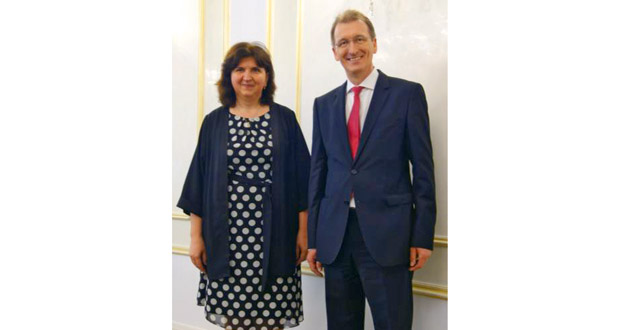Executives from the European coal industry met in June at the annual meeting of the European Association for Coal and Lignite (EURACOAL) to discuss the industry’s strategic direction against the backdrop of the UNFCCC Paris Agreement of December 2015 and the EU’s related commitment to a 40 % reduction in greenhouse gas emissions by 2030. Prior to the meeting, EURACOAL President, Dr. Wolfgang Cieslik, met with Corina Georgeta Popescu, Secretary of State at the Romanian Ministry of Energy, to discuss the current difficult situation in the European coal and lignite industry (Figure 1).
EURACOAL members, including coal and lignite producers, coal importers and major coal users from 18 countries, face an unprecedented, six-year long market downturn – reflecting a global crisis. The coal market is oversupplied and prices have slumped to levels not seen since 2003. Moreover, privileged feed-in tariffs for renewable energies have caused a collapse of wholesale electricity prices in the EU. Wholesale prices no longer cover the cost of any type of generation. Only those operating in regulated markets can contemplate investing for the future.
The European Commission’s “Road from Paris” communication on signing the Paris Agreement states that the, “EU’s commitment to a clean energy transition is irreversible and non-negotiable” (COM(2016) 110). Given this categorical political direction, coupled with a depressed market, the coal industry cannot survive in its current shape. In the end, there has to be again a fully functional market design which gives coal a profitable setting to run the necessary existing power plants and gives an opportunity for the new investments that will be needed to ensure continued grid stability. If not, then 300,000 jobs are at stake: men and women who work hard to provide 26 % of all the EU’s electricity, whatever the weather.
The industry proposes to the European Commission three measures in response to the crisis:
- Allow the EU Emission Trading System to function as intended and hence reduce the Union’s carbon emissions at the lowest cost to society.
- Review the 31st December 2018 deadline on State aid to the coal industry (Council Decision 2010/787/EU) so that Member States who did not yet submit a restructuring plan themselves can determine how best to manage the different decline rates of their own indigenous coal production.
- Respond to the opinion of the European Economic and Social Committee (CCMI/138) by developing a “Transition Support Plan for the Communities and Regions Dependent on Coal Production”. This plan should ensure that coal mining regions can really benefit from the irreversible and non-negotiable clean energy transition.
With coal, the EU’s energy transition will be more affordable and more secure. Without coal, the EU risks its competitive position in a world that is not turning away from coal. Japan is e. g. currently constructing or planning 40 new coal-fired power plants, including two state-of-the-art units at the Kobe Steel Works near Kyoto. (EURACOAL)
